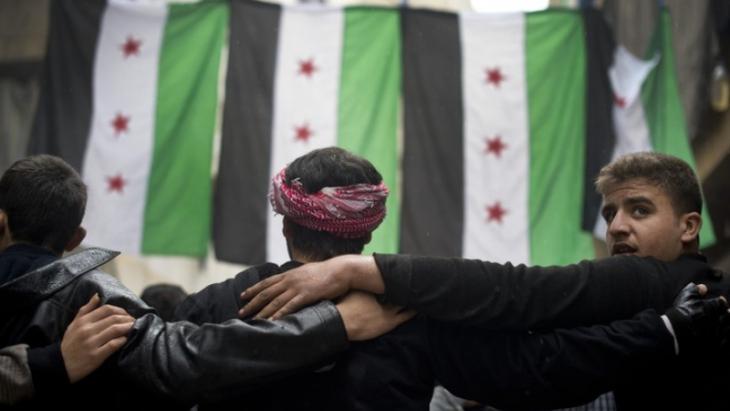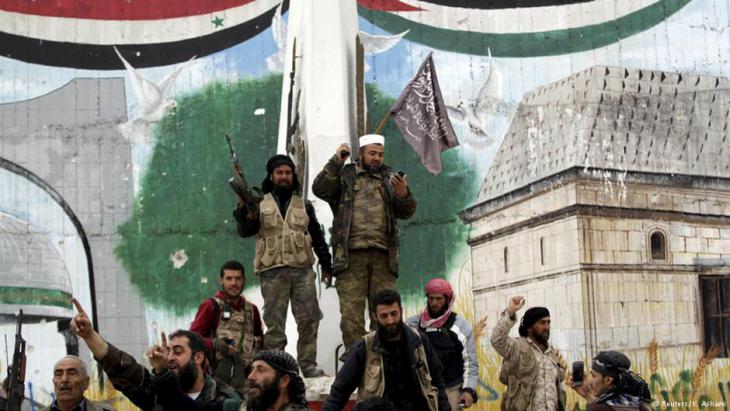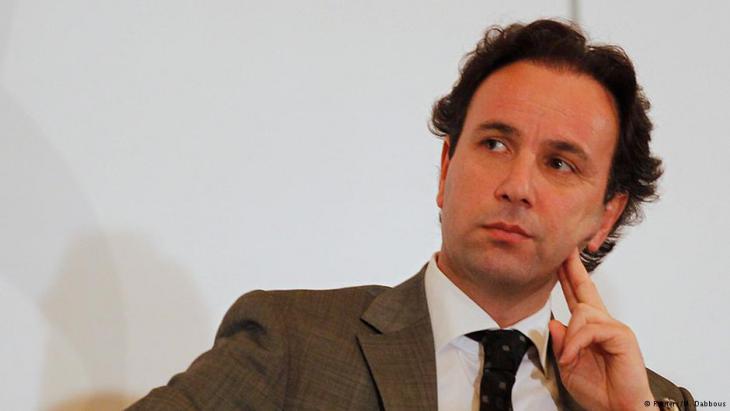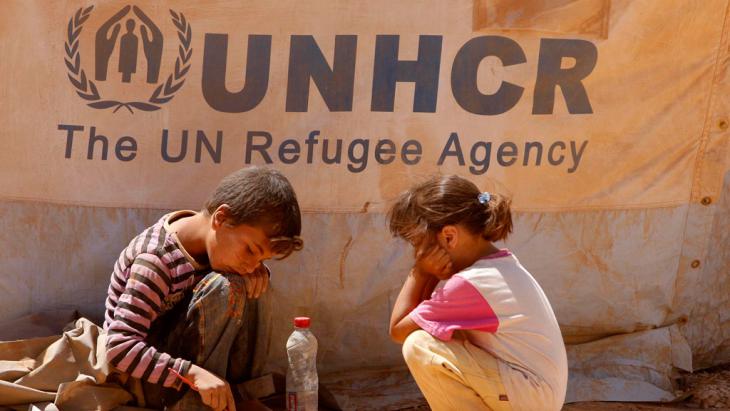People want professionals, not Facebook heroes

Mr Othman, in concrete terms, what are you doing for the people of Syria?
Nader Othman: The interim government is trying to provide services and to rebuild a civilian administration in the areas controlled by the opposition. That's our answer to militarisation and extremism. After four years, people have had enough of being governed by this brigade one week and another the next; they value civilian administration very highly.
Where are you active in Syria?
Othman: Our people reach about 40 per cent of the Syrian state territory, whereas we only have military control of around 25 per cent: large parts of the provinces of Aleppo and Idlib, areas around Homs und Hama, the Daraa and Quneitra provinces in the south and the area around Damascus.
The Nusra Front, the Syrian branch of al-Qaida, is also fighting in all these territories. The moderate rebels are being defeated by them in many places.
Othman: The Nusra Front lets our staff do their jobs. They can repair electricity networks or get the water supply working. Al-Nusra knows our employees only come to help people.

Who works for the interim government in Syria?
Othman: We have around 3,000 employees in Syria. Half of them are members of local councils and the others are engineers and technical staff. We work with 464 local councils and town administrations and have founded 55 directorates – for water, electricity, telecommunications, health and education.
Our experts were previously employed by the Assad regime. They know the networks, the problems and the spare parts needed to make repairs. Since these experts have been working around the country, people have noticed a difference to before, when the local councils consisted of heroes and volunteers with no technical knowledge. If I could, I'd employ tens of thousands, but we haven't even got enough money to pay regular wages.
Who finances the interim government?
Othman: No country supports us directly; all we've had is a one-off donation from Qatar. Since then, everyone's been asking whether Qatar has sent us more money. Why is that? Is Qatar our mother now? The whole world ought to be helping us! Of course, the world is spending a lot of money on Syria, but the governments prefer to work with large NGOs, which need 40 per cent of the money to cover their administration costs. These NGOs want to work with the local councils around the country. We've noticed how important these councils are for the international community, so we're trying to make them more professional.
I used to get two-line applications: "We need water for 5,000 people." Now, we've explained to those responsible how to make project applications and fill in the international NGOs' standard forms, because that's what gets them the support they need. So training is important, especially because there's always money for workshops because all the NGOs want to provide training. We're trying to train people who provide services in Syria and can be held responsible, which means they have to be elected or appointed in a democratic process.
How can democratic structures come about in the middle of a war?
Othman: We've managed it. We've organised free and democratic elections for eight provincial councils. The most recent was in Hama, only a few weeks ago. The chairman of the provincial council is a highly respected figure. It was a total success and we're proud of it, because the people are practicing something that was denied to them for decades. A free election in Syria after fifty years of dictatorship is a strong message.
How did it work?
Othman: It took a year and a half because we started a lengthy selection process to reach everyone and get everyone on board. We spoke to all influential groups in the area – ethnic, religious and military groups, tribes, professions, businesspeople – so that they'd take part and stand by the results. They formed an assembly, which then nominated representatives for the provincial council. The elections were transparent and democratic in accordance with international standards. There was time for objections after every stage; we only continued when everyone was agreed.

Where did the representatives meet?
Othman: The logistics were extremely difficult, because the situation in the rebel-controlled areas is very unsafe due to Assad's aerial attacks. You can't get 400 people together in one building without the regime finding out. And then they'd wipe them all out. So most elections took place outside Syria, in Turkey and Jordan. For some provincial councils, there were three ballots, each one costing 200,000 dollars.
Two hundred thousand dollars per ballot? Couldn't the money be used to greater effect for humanitarian aid?
Othman: We got part of the money for the elections from countries that want to foster democracy. And you can help people much better with effective and democratically legitimated structures! After all, it's exactly these elected councils that provide the Syrians with services like electricity, water, education and health.
The councils are getting a lot of international attention; everyone wants to work with them. But there has often been trouble and chaos because some places had three different councils. Now we have eight elected provincial councils, which are transparent, follow consistent mechanisms and can be held to account. Everyone is happy and they can at last do their work instead of having to defend their own legitimacy over and over again. Apart from that, people now regard us as legitimate; the Ministry of Local Administration is seen as a reference.
Really? Aren't some of the activists on the ground actually critical of the interim government?
Othman: There was a lot of resistance to begin with. But the activists are also part of the assembly. It brings together all the local influential forces, so that everyone feels represented. These differ greatly from one town to the next, depending on the social make-up and power relations. Ultimately, however, the elections brought quality. The elected representatives want their teams to be made up of professionals, not necessarily people with revolutionary experience. That was a learning process. At first, everyone wanted the hero to be the boss. But in most cases, the hero can't solve technical problems. The people on the ground understand that now. They've had enough of revolutionary and Facebook heroes; what they want now is competent personnel to improve their everyday lives.

Why did it take so long for the opposition to provide direct help for the Syrians?
Othman: You're blaming the interim government for the failings of the National Coalition; that's not fair. The government started at zero. If someone opens a shop, you don't measure their success during the first year. We started with a group of ministers; they had to set up a team, wait for money, employ people, build up the internal regulations and structures. We're not a government taking over from a previous government; no, we had nothing.
The US$50 million from Qatar have been used up. You are facing financial ruin.
Othman: Yes, we have a plan, projects and certain structures in the country, and now we're waiting for support. It all costs money. Our highest priority is to move into Syria with the government; we've been waiting ages for a no-fly zone – to no avail. We've decided to move in nevertheless, but with a different approach because it's very dangerous. The regime would love to wipe us out, and our staff's safety is paramount to us.
For this reason, we're in close contact with the military forces on the ground. They've also learned something, namely that they can't govern and administrate, they can only fight. So the rebels increasingly welcome the fact that we take care of the civilian administration in their territories. Take the Jaish al-Mujahideen brigade, for example, which chased the IS out of Aleppo in the past: their fighters now want to wear our uniforms, be perceived as our army. We keep out of the political discussions as far as possible. All we want is to help people and save Syria as a country.
Interview conducted by Kristin Helberg.
© Qantara.de 2015
Translated from the German by Katy Derbyshire
Nader Othman (b. 1967) qualified as a civil engineer in the UK and spent twenty years working for major oil and real estate companies in Dubai and Syria. When the revolution began in 2011, he supported local opposition structures. In January 2013, he left Damascus and became a project manager for the Local Assistance Coordination Unit (LACU) in Gaziantep/Turkey. He has been working for the interim government since April 2014 and was elected as its deputy prime minister in January.
